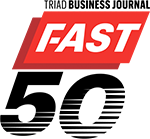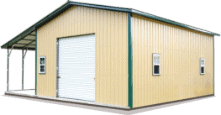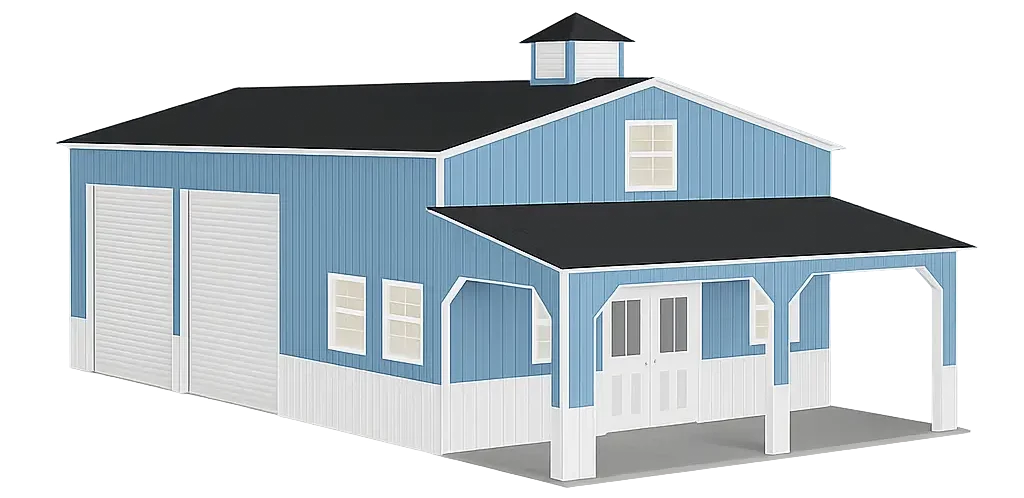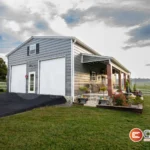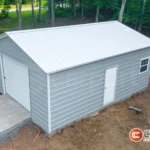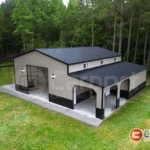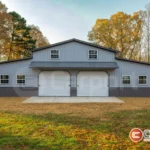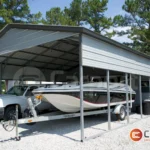14
Wind and Snow Ratings for Metal Buildings in NC
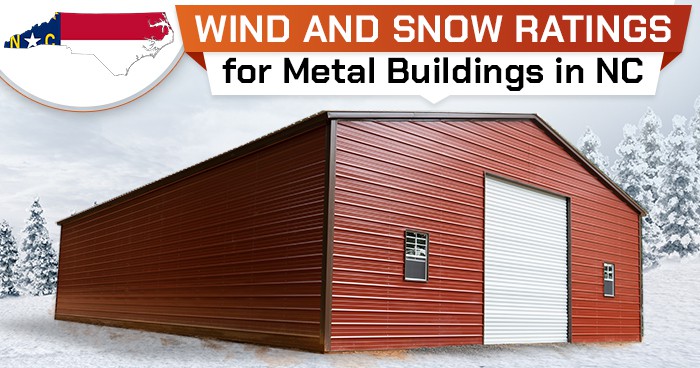
Winter is Coming to NC … In Fact, Winter is Here!
After a long, pleasant summer and a fairly mild fall, cold temperatures and winter weather have finally arrived in North Carolina. We’ve already gotten one snow so far, and a more significant frozen precipitation event is being forecast for much of NC this coming weekend. Snow! Ice! OMG! Exciting!
So, are you ready for winter? Would you benefit from having a metal building installed which can effectively protect your possessions and property, not just from winter weather threats, but from any seasonal weather threats through the course of the year? If so, you should entrust your business to a local metal buildings provider who not only knows NC weather, but can also provide custom metal buildings that are engineered to meet any needed local wind and snow rating requirements. And that metal buildings provider is Carport Central!
More Details About Building Loads and Codes
General standards have been developed for cold-formed steel tubing as a building material, but there are also some specific engineering and design guidelines that go along with the construction of any particular metal structure. To that end, most any building must meet certain building codes and load requirements, depending on the codes and regulations set by local municipalities, counties, and the state. Since many buildings are primarily intended to provide reliable shelter for people and property, each building should be constructed to meet a baseline of minimum standards.
Loads speak to a building’s ability to protect against various weights and forces which can be exerted on the building, like dead load, live load, etc. There are also load considerations which apply to specific forces of nature, like wind, snow, and seismic activity. Here’s a quick survey of some major building load categories:
WEIGHTS & FORCES LOADS
• Dead load
Dead load describes the weight of the structural components themselves. Total dead weight is one factor that must be taken into consideration when measuring the structural integrity of a building.
• Live load
Live load refers to any temporary load placed on a building, including things like building occupants, furnishings, equipment, materials, and other types of variable weights.
• Collateral load
Collateral load accounts for the weight of other permanent materials which aren’t part of the support structure. This includes ceilings, sprinkler systems, mechanical systems, electrical systems, etc., which are distributed evenly across the building.
• Concentrated load
Where collateral loads are evenly distributed, concentrated loads (or point loads) are focused in a specific area. The two most common types of concentrated loads are rooftop loads (like an HVAC unit) and suspended loads (like a space heater that’s suspended from the rafters).
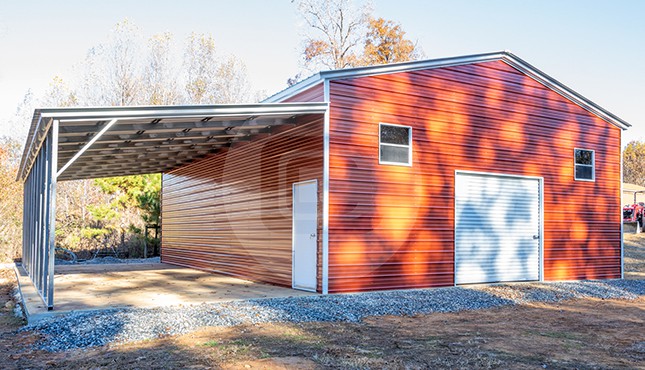
FORCES OF NATURE LOADS
• Wind load
Metal structures should be able to withstand the force of wind blowing in from any direction. Most areas of the country have some sort of minimum wind load rating as part of their building code. Some regions (like Florida) which are more prone to hurricanes, tornadoes, and significant wind events mandate a higher minimum wind load rating.
• Snow load
Snow load takes into account a building’s ability to support the vertical load of accumulated snow on the roof, as well as the weight of any snow that may drift and exert force against the side of a building. Snow load requirements can vary widely by geographic region.
• Seismic load
Not all areas are typically prone to extreme seismic activity, but earthquakes are still a possibility most anywhere. For this reason, many areas have established minimum seismic load requirements for buildings.
A Closer Look at Wind and Snow Threats in NC
In terms of forces of nature loads, the two which are most relevant to North Carolina, and to the East Coast in general, are wind and snow. Let’s start by looking at wind threats. While North Carolina and the Southeast aren’t technically considered to be part of Tornado Alley, we do still get tornadoes here. NC averages 31 tornadoes per year, ranking the state #17 in the nation for tornado frequency. And let’s not forget about hurricane season. Only three states – FL, TX, and LA – rate above NC for hurricane frequency. Nearly 20% of all US hurricanes make landfall in North Carolina; it’s no wonder that our NHL team was dubbed the Carolina Hurricanes!
While high winds are a potential threat for NC homeowners and businesses year-round, snow threats are generally limited to the winter season. But even so, we have received significant snowfall in the past during late fall and early spring. As recently as 2018, the NC foothills received 18 inches of snow in a 2-day storm event which occurred nearly two weeks before the first day of winter. And the March 1993 Storm of the Century produced a swath of snow which ranged from 6” across the Florida panhandle to SEVERAL FEET of snow in parts of NC, and it brought snow all the way up the Eastern seaboard. So yes, it does still snow in the Old North State, and sometimes that snow does accumulate!
Do I Really Need a Certified Metal Building in NC?
That’s a really good question. Does your metal building need to be certified? What certification means is that an engineer has professionally designed your building to meet or exceed specific minimum wind and snow loads. While certification isn’t universally required in every area of the state, many local building codes do require it. Much of it has to do with where you’re installing your building, and how you intend to use it. But whether certification is a legal requirement for you or not, certified metal buildings really make good sense. If you’re already considering making an investment in a metal building solution to meet your residential, agricultural, or business needs, why wouldn’t you want to choose the toughest, most durable building design available? Choosing a certified NC metal building means your structure will be built to a higher standard in terms of strength and resilience, which means you’ll have greater peace of mind no matter what Mother Nature decides to throw your way.
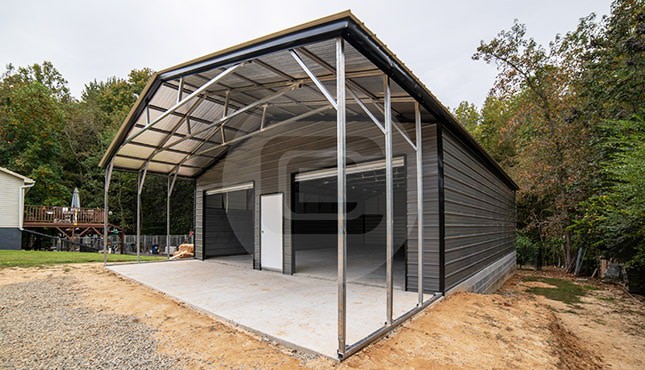
Carport Central Delivers the Best NC Metal Buildings!
If you’re reading this and you’re located in North Carolina, you might want to go ahead and stock up on some bread and milk before this weekend’s snow arrives. But if you’re ready to get the best custom prefab metal building solution to protect both people and property from the next wind event, snow event, or other storm threat, then connect with us at Carport Central now!
But what about certified metal building kits? Yep, we can provide you with one of those too, if you’d prefer to just install it yourself. Every metal structure we provide is custom made-to-order, and our buildings are designed to meet or exceed all local building code requirements. Whether you need a garage, barn, utility building, workshop, retail storefront, warehouse, manufacturing facility, production facility, office, barndominium, metal home, OR carport – we’ve got you covered! Our headquarters are right here in NC, but we also serve nearly all of the continental United States.
Got questions? Ready to get started? You can reach out online, or just give us a call at (980) 321-9898 to speak with one of our friendly building experts today.
And remember, Carport Central is about much more than just selling metal buildings. We’re Here to Provide Shelter for Your Way of Life!
Get Started
It's fast and easy. Get your instant quote today!
BLOG TOPICS
- Workshops (7)
- Eagles & Buildings (1)
- Reviews (2)
- Snowfall in the Southeast (2)
- Carports and Buildings Prices (1)
- Reality Of Discounted Buildings (2)
- Snow Removal (1)
- Offers (3)
- Condensation in Metal Buildings (2)
- News & Awards (12)
- Livestock sheds (4)
- Installations (15)
- Metal Buildings Applications (7)
- Customized Buildings (41)
- Carport Sizes (2)
- Facts (1)
- Certified Carports (2)
- COVID-19 (1)
- Prefab Metal Buildings (66)
- Metal Building Homes (6)
- Metal Building of the Week (11)
- Install of the week (1)
- Metal Building Extensions (1)
- Install of the month (2)
- Garages (52)
- Farm Show (1)
- Building Components (1)
- Carports (29)
- Storage Sheds (15)
- Metal Buildings (6)
- Barns (18)
- Metal Homes (8)
- Metal Sheds (1)
- RV Covers (6)
- 12 Gauge Framing (7)
Metal Buildings
- Alabama
- Arizona
- Arkansas
- California
- Colorado
- Connecticut
- Delaware
- Florida
- Georgia
- Idaho
- Illinois
- Indiana
- Iowa
- Kansas
- Louisiana
- Maine
- Maryland
- Massachusetts
- Michigan
- Minnesota
- Mississippi
- Missouri
- Montana
- Nebraska
- Nevada
- New Hampshire
- New Jersey
- New Mexico
- New York
- North Carolina
- North Dakota
- Ohio
- Oklahoma
- Oregon
- Pennsylvania
- Rhode Island
- South Carolina
- South Dakota
- Tennessee
- Texas
- Utah
- Vermont
- Virginia
- Washington
- West Virginia
- Wisconsin
- Wyoming
Metal Garages
- Alabama
- Arizona
- Arkansas
- California
- Colorado
- Connecticut
- Delaware
- Florida
- Georgia
- Idaho
- Illinois
- Indiana
- Iowa
- Kansas
- Louisiana
- Maine
- Maryland
- Massachusetts
- Michigan
- Minnesota
- Mississippi
- Missouri
- Montana
- Nebraska
- Nevada
- New Hampshire
- New Jersey
- New Mexico
- New York
- North Carolina
- North Dakota
- Ohio
- Oklahoma
- Oregon
- Pennsylvania
- Rhode Island
- South Carolina
- South Dakota
- Tennessee
- Texas
- Utah
- Vermont
- Virginia
- Washington
- West Virginia
- Wisconsin
- Wyoming
Metal Carports
- Alabama
- Arizona
- Arkansas
- California
- Colorado
- Connecticut
- Delaware
- Florida
- Georgia
- Idaho
- Illinois
- Indiana
- Iowa
- Kansas
- Louisiana
- Maine
- Maryland
- Massachusetts
- Michigan
- Minnesota
- Mississippi
- Missouri
- Montana
- Nebraska
- Nevada
- New Hampshire
- New Jersey
- New Mexico
- New York
- North Carolina
- North Dakota
- Ohio
- Oklahoma
- Oregon
- Pennsylvania
- Rhode Island
- South Carolina
- South Dakota
- Tennessee
- Texas
- Utah
- Vermont
- Virginia
- Washington
- West Virginia
- Wisconsin
- Wyoming
- 100x100 Metal Building
- 12x12 Metal Shed
- 12x20 Carport
- 12x24 Carport
- 12x30 Carport
- 16x20 Carport
- 18x20 Carport
- 20x20 Carport
- 20x20 Metal Building
- 20x30 Carport
- 20x30 Metal Building
- 20x40 Carport
- 20x40 Metal Building
- 24x24 Carport
- 24x24 Garage
- 24x30 Carport
- 24x30 Metal Building
- 24x30 Metal Garage
- 24x36 Metal Building
- 26x30 Metal Building
- 30x30 Carport
- 30x30 Garage
- 30x30 Metal Building
- 30x40 Carport
- 30x40 Garage
- 30x40 Metal Building
- 30x40 Storage Building
- 30x50 Metal Building
- 30x60 Metal Building
- 40x100 Metal Building
- 40x40 Metal Building
- 40x60 Metal Building
- 40x80 Metal Building
- 50x100 Metal Building
- 50x50 Metal Building
- 50x80 Metal Building
- 60x100 Metal Building
- 60x120 Steel Building
- 60x60 Metal Building
- 60x80 Metal Building
- 80x100 Metal Building
- All Steel Carports
- American Building Network
- American Custom Carports
- American Steel Carports
- Arkansas Carports
- Best Choice Metal Structures
- California All Steel
- Carports Outlet
- Central Texas Metal Buildings
- Coast To Coast Carports
- Custom Steel Structures
- Dreams Carports and Buildings Inc
- East Coast Carports
- Enterprise Steel Structures
- Infinity Carports
- Interstate Steel Structures
- Long Horn Buildings
- Midwest Steel Carports
- NC Structures
- New Team Carports
- Northside Metal Carports
- Quality Carports
- Rhino Carports
- Safeguard Metal Buildings
- Southern Steel Buildings Inc.
- Steel Buildings and Structures
- Tennessee Steel Buildings
- Tubular Building Systems
- Ultimate Metal Buildings
- United Structures
- USA Carports


